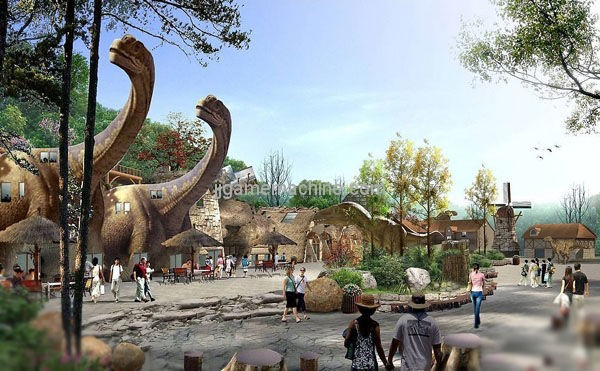Behind the prosperity of the theme park, the theme park “fast-lived and fast-dead” phenomenon caused by impulsive construction and homogenization competition has gradually emerged.

In April of this year, the five national departments issued a document to strictly control the theme park real estate, and then set off a wave of "fake park real estate". On August 16th, the Beijing Business Daily reporter was informed that the Ministry of Housing and Urban-Rural Development of Yunnan Province has issued the Notice on Strengthening the Management of the Theme Park Planning and Construction (hereinafter referred to as the “Notice”), and Hainan, Gansu and other places have also issued new policies. Strengthen the management and control of theme park projects.
At this point, the theme parks that bloom everywhere in the country are put on the curse. The industry generally believes that the real estate of theme parks has indeed deviated from the nature of tourism, and brought many hidden dangers. From the state to the local strict management, it will force a huge change in the operation mode of domestic theme parks.
Landing
The Ministry of Housing and Urban-Rural Development of Yunnan Province stressed in the notice that it is necessary to strictly control the real estate development around the theme parks, and it is not allowed to support the real estate development projects for the theme park projects through adjustment planning, and the non-disguised development of the theme parks and surrounding real estates should be prevented in disguise to prevent “fake parks”. Real estate project.
In addition to Yunnan, many places in China have successively launched the theme park project. According to public data, in recent years, China's tourism industry has transformed from sightseeing to leisure vacations, and theme parks have gradually become an industry enthusiasm. In 2017, the retail sales of China's theme park market reached nearly 40 billion yuan, an increase of 27% over 2016.
It is estimated that by 2022 this figure will reach 89.239 billion yuan. At the same time, however, problems such as unclear concepts, blind construction, imitation plagiarism, and low-level repetition have emerged in the development of mass parks in theme parks. In some areas, local debt risks and real estate trends have emerged.
To this end, the National Development and Reform Commission and other five departments have jointly issued the "Guiding Opinions on Regulating the Construction and Development of Theme Parks", stating that it is strictly forbidden to occupy various types of protected areas or destroy the ecology in the name of the construction of theme parks, and strictly control the real estate development around the theme parks. Theme park construction increases local government debt.
In addition, real estate development projects such as hotels, restaurants, shopping, and residences around the theme park must be separately provided for land supply and separate approval. They must not be bundled with the theme park for land supply, bundled for approval, or set conditions in bidding and auction. The theme park is bundled with real estate development.
As soon as the policy came out, many places began to act quickly. Prior to the implementation of the "Implementation Opinions on Standardizing the Construction of Characteristic Small Towns and Characteristic Small Towns" issued by Gansu Province, it also required strict control of government debt risks and real estate trends in the construction of characteristic towns and characteristic small towns. Hainan, on the other hand, is mainly aimed at reclamation of the construction of the island to emphasize the prohibition of pure commodity housing construction.
Rectify
Along with the policy, the theme parks were included in the strict list, and various projects also showed variables. A theme park operator who did not want to be named told the Beijing Business Daily that the company is evaluating and studying the impact of the New Deal.
Just a few days ago, Hainan Province’s “Implementation of National Ocean Inspector Feedback Improvement Plan” issued by the Hainan Provincial Department of Oceans and Fisheries mentioned three projects: Wenchang Coconut Grove Resort Artificial Island and Wanning Riyuewan Ridao. The land formed by reclamation shall not be engaged in the development of commercial housing. At the same time, the disposal plan for long-term idle land reclamation will be formulated, and the plan for the formation of land reclamation will be organized in conjunction with the disposal plan, and reported to the Provincial Planning Commission for approval after examination and approval.
Taking the Sun and Moon Shuangdao Project as an example, the local government requested the Provincial Department of Land and Resources to direct the Wanning Municipal Government to carry out land sales in accordance with relevant laws and regulations in strict accordance with relevant laws and regulations, and prohibit the construction of pure commercial housing.
For the land that has been transferred but not built, adjust and optimize the construction plan, order the enterprise to adjust and enrich the product type, increase the tourism and holiday products, and increase the public service facilities. At the same time, encourage enterprises to sign timeshare agreements with their owners, and change residential products into quasi-operating products.
In this regard, Li Xinjian, deputy secretary general of the China Tourism Reform and Development Advisory Committee and dean of the School of Tourism Management of the Beijing Second Foreign Languages School, said in an interview with the Beijing Business Daily that “the timeshare formulation should be aimed at resolving the previously approved construction. The legacy of real estate projects, if not sold as commercial housing in the future, can be used as a timeshare product, but this will never be another way to bind real estate in theme parks."
According to another report, the relevant departments of the Nanjing Municipal Government also organized a meeting to conduct a comprehensive investigation of the existing theme park projects. At the foot of Nanjing Fangshan, the future of the “Nanjing DreamWorks” project, which has been brewing for four years, is uncertain.
It is reported that at the China Nanjing Cultural and Creative Industry Project Promotion Conference 2014, the Nanjing Shimao DreamWorks Project, which has a total investment of 50 billion yuan, will be located in Jiangning High-tech Park. The overall development plan is divided into three phases, and preliminary construction projects are planned for 2015. In the first phase, however, the project has not yet started.

Graphic and unrelated
Forced
Behind the prosperity of the theme park, the theme park “fast-lived and fast-dead” phenomenon caused by impulsive construction and homogenization competition has gradually emerged. It is reported that there are currently about 300 domestic theme parks with an investment of more than 50 million yuan. The theme parks with a certain reputation and good operating conditions are only 10%, and most other theme parks are at a loss. If you leave the real estate support, the operation of the theme park will face more pressure, and the change of the model is imminent.
In fact, in the past decade, the chaos of real estate and theme parks has shown a trend of normalization. According to analysis, the real estate market is hot in the early years, and the return on capital is fast; the theme park has a large investment and a long payback period. Therefore, for investors, it is not advisable to invest in theme parks from the perspective of economic feasibility and financial analysis.
Therefore, the combination of real estate and theme parks became a common investment model at that time. But now that China has entered the new normal of the economy, the era of investment that seeks to make huge profits has passed, and the real estate industry has gradually stabilized. With the government's tactics of strictly controlling the theme parks, the real estate developers began to withdraw from the mainstream market by taking advantage of the theme parks.
“In the past, because real estate can quickly return funds, so 'the theme park + real estate' seems to have become a fixed match, then under the strict control of the country, the theme park can only rely on the expansion of the new 'money way' to ease the pressure on business." Li Xinjian told the Beijing Business Daily reporter.
In his view, internationally renowned theme parks such as Disney and Universal Studios do not rely on real estate to make money, but also rely on their own IP and park consumption. On the other hand, many local theme parks have short-boards on their own IPs, and their ability to mine and integrate traditional cultures is weak. There are widespread problems such as homogenization, low culture, and less planning. Restricting the "fake park real estate" can force the paradise and the transformation of the scenic spot, so that the theme park is more focused on improving the competitiveness of the main business.
Wang Xingbin, a senior tourism expert, pointed out that theme parks are high-investment and high-risk projects, and it is quite difficult to do a good theme. Therefore, the local government should also do a reasonable urban planning to avoid the blindness of the construction and cause a partial market surplus, which in turn triggers the phenomenon of “fast-speed death” in theme parks.




